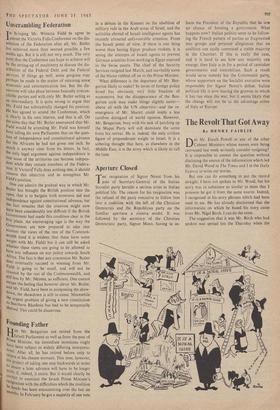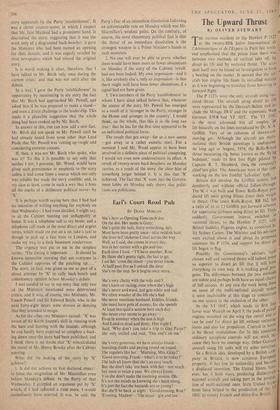The Revolt That Got Away
By HENRY FAIRLIE
DID Mr. Enoch Powell or any of the other Cabinet Ministers whose names were being canvassed last week seriously consider resigning? It is impossible to answer the question without disclosing the source of the information which led Mr. David Wood in The Times and I in the Daily Express to write our stories.
But one can do something to put the record straight. I have not spoken to Mr. Wood, but his story was in substance so similar to mine that I presume he got it from the same source. Indeed, I recognised in his story phrases which had been used to me. He has already disclaimed that the information on which he based his story came from Mr. Nigel Birch. I can do the same.
The suggestion that it was Mr. Birch who had spoken was spread (on the Thursday when the story appeared) by the Party 'establishment'. It was a clever counter-move, in which I suspect that Mr. fain Macleod had a prominent hand. It discredited the story, suggesting that it was the work only of a disgruntled back-bencher; it gave the Ministers who had been named an opening for their denials; and it was eagerly retailed by rival newspapers which had missed the original story.
It is worth making it clear, therefore, that I have talked to Mr. Birch only once during the current crisis: and that was not until after the debate.
In a way, I gave the Party 'establishment' its opportunity by mentioning in my story the fact that Mr. Birch had approached Mr. Powell, and asked him if he was prepared to make a stand— and even a direct challenge to the leadership. This made it a plausible suggestion that the whole thing had been cooked up by Mr. Birch.
In answer to this, one can now add a new fact. Mr. Birch did not speak to Mr. Powell until he had already heard from none other than Lord Poole that Mr. Powell was 'cutting up rough' and considering extreme courses.
If, then, it was not Mr. Birch who spoke, who was it? To this it is possible to say only that. neither I nor, I presume, Mr. Wood, would have given such prominence or emphasis to the story unless it had come from a source which not only was reliable but made the story credible; and, in my case at least, came in such a way that it bore all the marks of a deliberate political move—by `X'.
It is perhaps worth saying here that I had had no intention of writing anything for anybody on that Wednesday : I had even decided, I might say, to sit the Cabinet meeting out unflappably at home. It was a telephone call to my home, and a telephone call made in the most direct and urgent terms, which made me put on a tie, take a taxi to Slough to pick up a fast train to London, and make my way to a dark basement rendezvous.
The urgency was put to me in the simplest terms: 'The timing is important. .. It should be known tomorrow morning that not everyone in the Cabinet approves of the patching up.... ' The story, in fact, was given to me as part of a direct attempt by 'X' to rally back-bench and constituency opinion before Monday's debate.
I was careful to say in my story that only two of the Ministers mentioned were determined critics; and it was, of course, two Ministers, Mr. Enoch Powell and Sir Edward Boyle, who in the next forty-eight hours were slowest in denying that they intended to resign.
As for the other two Ministers named : 'X' was aware of Sir Keith Joseph's skill in running with the hare and hunting with the hounds, although he can hardly have expected so'complete a back- ing down once the story had been published; and I think there is no doubt that 'X' miscalculated the mood of Mr. Henry Brooke after the Cabinet meeting.
What did the leaking of the story by 'X' achieve?
1. It did not achieve its first declared object : to force the resignation of Mr. Macmillan even before Monday's debate. In the flurry of that Wednesday. I accepted an argument put by 'X' which, if I had reflected a little more, I would immediately have rejected. It was, he said, the Party's fear of an immediate dissolution following an unfavourable vote on Monday which was Mr. Macmillan's weakest point. On the contrary, of course, the most elementary political fact is that the threat of an immediate dissolution is the strongest weapon in a Prime Minister's hands at such moments.
2. No one will ever be able to prove whether there would have been more or fewer abstentions on Monday if the story of the Cabinet 'revolt' had not been leaked. My own impression—and it is, like anybody else's, only an impression—is that there might well have been fewer abstentions if a signal had not been given.
3. Two members of the Party 'establishment' to whom I have since talked believe that, whatever the source of the story Mr. Powell has emerged as a result of it 'stronger in the Party, stronger in the House and stronger in the country'. I would think, on the whole, that this is in the long run true : that he has for the first time appeared to be an individual political force.
The revolt that got away—for so it now seems —got away to a rather esoteric start. For a moment I and. Mr. Wood appear to have been involved in a definite piece of political conspiring. I would not even now underestimate its effect. A revolt of twenty-seven back-benchers on Monday carries, as a result of the story, the clear hint of something larger behind it. It is this that 'X' achieved. The fact that 'X' went into the Govern- ment lobby on Monday only shows that politi- cians are politicians.



































 Previous page
Previous page